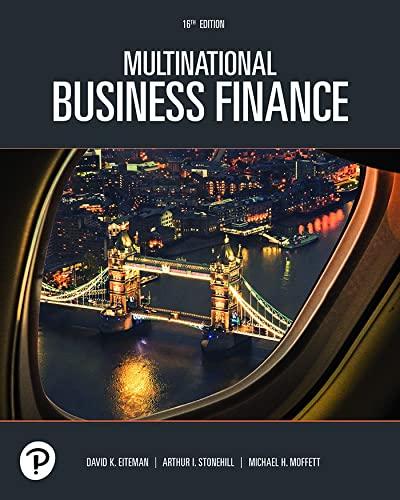Question
Suppose that the company Startup Inc. has existing assets that are either worth $100 or $190, each with equal probability, and an investment opportunity requiring
Suppose that the company Startup Inc. has existing assets that are either worth $100 or $190, each with equal probability, and an investment opportunity requiring an expenditure of $100 that pays off $120 for sure. Startup has no cash, but it can raise the $100 it needs to invest by issuing equity in an initial public offering (IPO). Both Startups current owners and potential new investors are aware of the possible values of the existing assets and the probabilities of these values as well as the payoff to the project. However, neither the current owners nor potential investors know what the firms existing assets are actually worth. Assume no discounting, no taxes, and no bankruptcy costs.
2a) What fraction of its equity will Startup have to provide to new investors in an IPO in exchange for the $100 of capital? Will Startup undertake the IPO on these terms?
2b) Now, suppose that Startups current owners know whether its existing assets are worth $100 or $190 but potential IPO investors do not. Further, suppose that potential IPO investors value Startup as though there is a 50% chance that its existing assets are worth $100 and a 50% chance that they are worth $190, so that the pricing will be the same as in part a. Will Startup undertake an IPO if its existing assets are worth $100? Will Startup undertake an IPO if its existing assets are worth $190?
2c) Suppose, as in part b, that Startups current owners know whether its existing assets are worth $100 or $190 and potential IPO investors do not. Now, suppose that a private equity (PE) firm has the opportunity to offer to invest $100 in Startup before Startup decides whether to undertake an IPO. If Startup takes the PE firms $100, then it will not undertake the IPO. There is a 50% chance that the PE firm will observe the true value of Startups existing assets before making an offer and a 50% chance that they will not. If it does not, then the PE firm simply knows that there is a 50% chance that the existing assets are worth $100 and a 50% chance that they are worth $190 (i.e., the PE firm has the same information that potential IPO investors have). Only the PE firm knows whether it actually observes the true value of Startups existing assets. Startup will take the PE firms capital as long as doing so makes the current owners better off than under the next best alternative (either an IPO or simply not raising capital).
Suppose that potential IPO investors expect that the PE firm will invest in Startup if the PE firm observes that the existing assets are worth $190 but not if it observes that the existing assets are worth $100 or if it does not observe the value of the existing assets, and that Startup will IPO if the PE firm does not invest. While only the PE firm knows whether it actually observes the true value of Startups existing assets, potential IPO investors are aware that the PE firm can offer to invest in Startup and that the PE firm observes the value of Startups existing assets with probability 50%. If the firm IPOs, then these investors know that the PE firm did not invest in Startup. Given these assumptions, what fraction of Startups equity will it have to sell to IPO investors if it IPOs? What percentage of Startups equity will it sell to the PE firm if the PE firm invests? If Startups existing assets are worth $190, will it actually IPO if the PE firm does not invest? If Startups existing assets are worth $100, will it actually IPO if the PE firm does not invest? Hint: Normally, we compute the percentage of equity that a company must give to investors in exchange for capital that allows investors to earn its cost of capital, on average. If we assume that there is no discounting, then this percentage will allow investors to just break even on average. The basis for this assumption is that capital markets are competitive (there are a lot of investors, all with the same information, and the company does not care whose money it takes). However, the PE firm has an advantage here because it has information that IPO investors do not. The PE firm need only offer the company a deal that shareholders prefer over the IPO, which allows the PE firm to do better than breaking even on average.
Step by Step Solution
There are 3 Steps involved in it
Step: 1

Get Instant Access to Expert-Tailored Solutions
See step-by-step solutions with expert insights and AI powered tools for academic success
Step: 2

Step: 3

Ace Your Homework with AI
Get the answers you need in no time with our AI-driven, step-by-step assistance
Get Started


